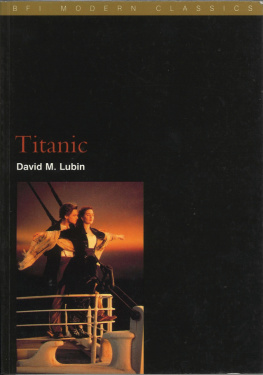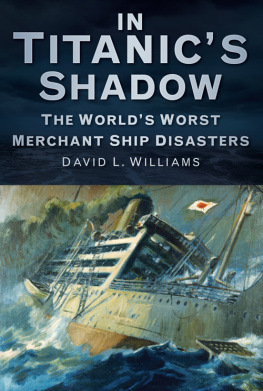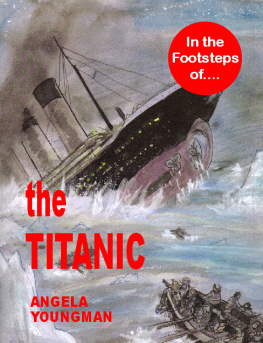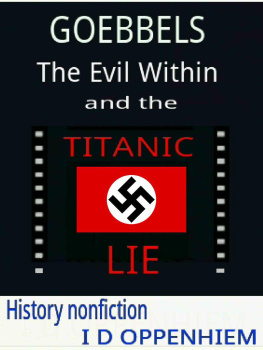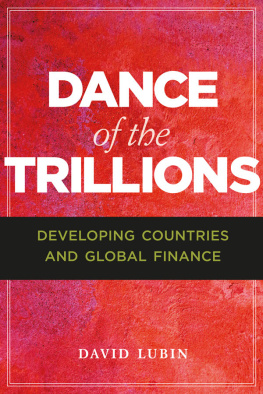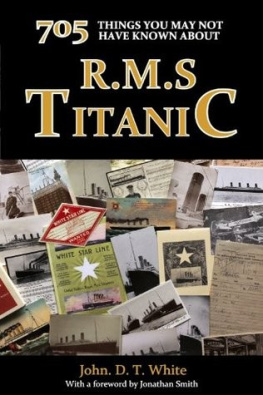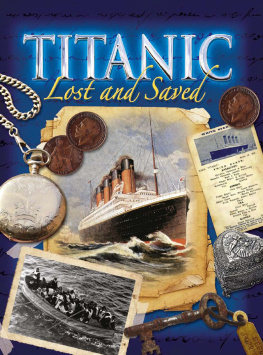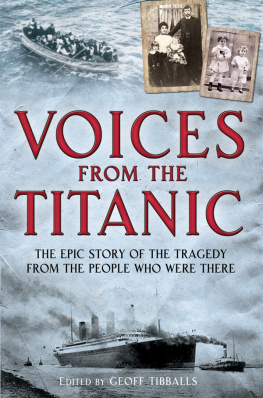David M. Lubin - Titanic
Here you can read online David M. Lubin - Titanic full text of the book (entire story) in english for free. Download pdf and epub, get meaning, cover and reviews about this ebook. year: 2019, publisher: Bloomsbury Publishing, genre: Romance novel. Description of the work, (preface) as well as reviews are available. Best literature library LitArk.com created for fans of good reading and offers a wide selection of genres:
Romance novel
Science fiction
Adventure
Detective
Science
History
Home and family
Prose
Art
Politics
Computer
Non-fiction
Religion
Business
Children
Humor
Choose a favorite category and find really read worthwhile books. Enjoy immersion in the world of imagination, feel the emotions of the characters or learn something new for yourself, make an fascinating discovery.
- Book:Titanic
- Author:
- Publisher:Bloomsbury Publishing
- Genre:
- Year:2019
- Rating:4 / 5
- Favourites:Add to favourites
- Your mark:
- 80
- 1
- 2
- 3
- 4
- 5
Titanic: summary, description and annotation
We offer to read an annotation, description, summary or preface (depends on what the author of the book "Titanic" wrote himself). If you haven't found the necessary information about the book — write in the comments, we will try to find it.
Titanic — read online for free the complete book (whole text) full work
Below is the text of the book, divided by pages. System saving the place of the last page read, allows you to conveniently read the book "Titanic" online for free, without having to search again every time where you left off. Put a bookmark, and you can go to the page where you finished reading at any time.
Font size:
Interval:
Bookmark:

BFI Modern Classics
Rob White
Series Editor
Advancing into its second century, the cinema is now a mature art form with an established list of classics. But contemporary cinema is so subject to every shift in fashion regarding aesthetics, morals and ideas that judgments on the true worth of recent films are liable to be risky and controversial; yet they are essential if we want to know where the cinema is going and what it can achieve.
As part of the British Film Institutes commitment to the promotion and evaluation of contemporary cinema, and in conjunction with the influential BFI Film Classics series, BFI Modern Classics is a series of books devoted to individual films of recent years. Distinguished film critics, scholars and novelists explore the production and reception of their chosen films in the context of an argument about the films importance. Insightful, considered, often impassioned, these elegant, beautifully illustrated books will set the agenda for debates about what matters in modern cinema.


Contents

Whos Seen It, Why?
For a movie that sold more tickets in its first year of release than any other motion picture in history, a movie that was the first ever to gross one billion dollars in worldwide sales, Titanic has been seen by few people I know. When I began telling my friends, colleagues and students that I was writing a detailed analysis of the blockbuster, I was surprised at how few of them had seen it or at least were willing to admit they had. Eventually this response proved so predictable that I eventually switched gears or, to use a metaphor from the film reversed engines and now have come to be surprised when someone I know actually says, Oh, yes, Ive seen that film. The greatest surprise of all is when he or she adds, And I loved it.
As the French sociologist Pierre Bourdieu details in Distinction, the consumption or non-consumption of popular culture artefacts is a means by which individuals in a society define for themselves and others their social position, their status. To consume an artefact that most everyone else in your peer group has been consuming, and to relish it along with them, is to strengthen your affiliation. To make a choice not to consume an artefact that you perceive to be distasteful to your own class faction is likewise a means of affirming your legitimate place within that faction. Consuming or not consuming the artefact in question can even be a tactic for dissociating yourself from your present peer group in order to associate yourself with another.
Something of this sort goes on all the time as we make decisions, first, what movies to see or not see and, second, whether to be enthralled by them or instead turn up our noses and loudly protest having wasted our time. I think it has something to do with why so few of my acquaintances in the professional managerial middle class made a point of viewing Titanic and why, in fact, so many of them made it a point of pride to stay away from a film that was hyped almost beyond belief in the first months of its release. Refusing to see Titanic, or, if seeing it, refusing to be taken in by it (in a key phrase from the film dialogue, to let it in), became a way of asserting ones independence from all the journalistic gush surrounding James Camerons film and all the highly suspect emotional manipulation within it.

True love or true hype?
This is not to say that critics of Titanic are unjustified in finding it a crude, tawdry, manipulative example of cinematic art. There are, indeed, sound aesthetic reasons for considering the film closer in kinship and kitsch to Ship of Fools, The Poseidon Adventure and even The Love Boat than to Battleship Potempkin. But, still, the critical backlash against Titanic in some of the popular and trade press was so excessive that one can only wonder if the bombardment against Camerons ship of dreams wasnt really aimed at a larger target than the particular film in question.
Leading the onslaught was the influential senior film reviewer for the Los Angeles Times, Kenneth Turan, who availed himself of every opportunity to pepper Titanic with grapeshot from the moment of its US premire in late December 1997 to its film-industry apotheosis the following March when at the Academy Awards ceremony it tied the illustrious record set in 1959 by Ben-Hur for the most Oscars (11) ever
The enemy here appears to be contemporary popular taste, mass culture, the McDonaldization of sensibility with regard to hamburgers and blockbusters alike. Not that Turan assigns the blame for this degradation of standards to the masses themselves, but rather to the culture industry that has seduced or otherwise commandeered their attention: Titanics ability to attract a crowd, he continues, shows how desperate the mainstream audience alienated by studio reliance on the kind of mindless violence that can be counted on to sell overseas has become for anything even resembling old-fashioned entertainment. Deadened by exposure to nonstop trash audiences have been sadly eager to embrace a film that, putting the best face on it, is a witless counterfeit of Hollywoods Golden Age, a compendium of clichs that add up to a reasonable facsimile of a film.
Film studies professor Jos Arroyo concurs not only with Turans assessment of Titanics flaws but his conviction that these flaws are endemic to the current state of market-driven film-making: It is because of its lack of story-telling skills and its execrable character delineation that Titanic is emblematic of contemporary Hollywood action / spectacle it is also because of this that it is not a good film.
The Newsweek piece drew upon a variety of media producers and pundits to suggest that the movie was tapping into widespread public desires to move beyond, in Camille Paglias words, shallow postmodernist irony and cynicism toward a cynicism-free product that celebrates themes of selflessness, self-sacrifice and cross-class bonding. Feminist author Mary Pipher (Reviving Orphelia) contended that the movie was really about [Jack] helping [Rose] become an authentic whole person, while 29-year-old male Japanese magazine editor Naoshi Kayashima valued it as an examination of male cowardice and courage (a movie about how men choose their endings), and 63-year-old theatre director Andr Gregory explained that, for him, the movie was really about that old woman. I was moved that she could fight her way out of a life that was imposed on her by her family, and by society.
The thrust of the Newsweek coverage was to designate Titanic as a womens film with crossover appeal to men who want more from a movie than simply colossal effects and brutal physical action. Yet despite Newsweeks acknowledgment of the films emotional appeal to male as well as female filmgoers, it characterized Titanics typical viewer particularly its repeat viewer as a female under the age of 25. Polls cited by the article found that 60 per cent of
Font size:
Interval:
Bookmark:
Similar books «Titanic»
Look at similar books to Titanic. We have selected literature similar in name and meaning in the hope of providing readers with more options to find new, interesting, not yet read works.
Discussion, reviews of the book Titanic and just readers' own opinions. Leave your comments, write what you think about the work, its meaning or the main characters. Specify what exactly you liked and what you didn't like, and why you think so.

